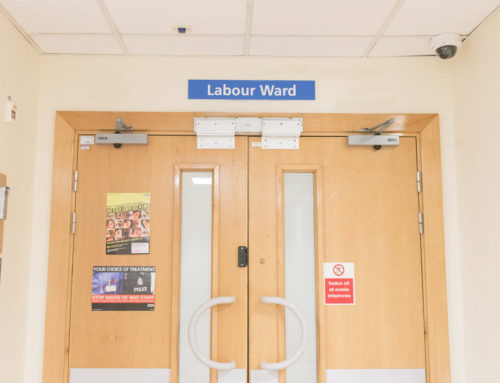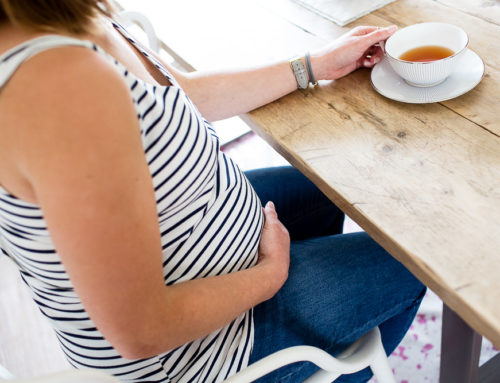This month I’m going to be talking about a relatively new type of prenatal testing/screening that is available in the UK on a private basis. It’s something that has only been on my radar for about a year, and I initially heard about it through a friend who chose to have this type of screening test for her baby, rather than through my work as a doctor, so I’d be really interested to hear if many of you are aware that these tests are available, or if you’ve had them done during your pregnancy.
Non-invasive prenatal testing (NIPT) is a screening test for common genetic conditions, including Down’s syndrome, Edward’s syndrome and Patau’s syndrome, and also some sex chromosome abnormalities such as Turner’s syndrome and Klinefelter syndrome. The tests can also determine the sex of your baby, but of course you can opt out of this if you have chosen to keep it a surprise. In addition to these chromosome abnormalities, you can choose to have additional genetic testing for five different syndromes that are caused by microdeletions (where a small piece of a chromosome is missing). NIPT can be done as early as 9-10 weeks into your pregnancy, and is performed simply by taking a maternal blood sample, which is sent off to the laboratory for analysis, with results sent to you between 5 and 10 days later.
How does NIPT work?
During pregnancy, fragments of your baby’s DNA enter your blood stream. These screening tests are able to analyse that cell-free DNA and assess the chance that your baby has one of the chromosomal abnormalities that are being tested for. A simple way of thinking about this that I use is, for example, if they analyse your blood sample and find Y chromosomes within it, it’s pretty certain that you must be carrying a male baby — although I’m sure that the process is far more complicated than that!
How reliable is NIPT?
The results are given in terms of a chance of having an individual abnormality – either low or high risk. The detection rate is slightly different for the different syndromes, but is more reliable than the traditional first trimester screening test offered on the NHS. For Down’s syndrome, the detection rate (true positive result) for NIPT is greater than 99%, and the false positive rate (results show a ‘high risk’ when the baby does not actually have Down’s syndrome) for NIPT is less than 0.1%.
How does this compare to the NHS first trimester screening programme?
At present, the NHS first trimester screening that all women are offered is called the triple test, consisting of a blood test and a measurement of the fluid at the back of the baby’s neck, called nuchal translucency. Results are also given in the form of low or high risk, but with the triple test, you will also be given an estimate of that risk, e.g. ‘low risk – 1/64,000’.
For Down’s syndrome, the detection rate for the NHS first trimester screening is around 79%, meaning that about 20 out of 100 babies born with Down’s syndrome, where all 100 mothers had the NHS first trimester screening, will have been given a ‘low risk’ result. This sounds alarming, but this is not actually the case in reality, as the NHS screening test classes anything greater than 1 in 150 as a ‘high risk’, and those mothers will be offered further testing, in order to increase the detection rate for Down’s syndrome. For Down’s syndrome, the false positive rate for the NHS first trimester screening it is 3-5% (again, for the reason stated above, this figure is actually higher, meaning that if you get a ‘high risk’ result on the NHS screening test, your chances of having a baby with Down’s syndrome are actually very low.
Further testing
If you are given a ‘high risk’ result following either NIPT or NHS first trimester screening, you should be counselled on your options and offered one of the following:
Chorionic villus sampling (CVS)
This is where a few cells from the placenta are collected using a needle through the tummy. It can be carried out between 11 and 14 weeks of pregnancy. CVS does carry a risk of miscarriage of around 0.5-1%.
Amniocentesis
This is where a sample of amniotic fluid is collected using a needle through the tummy. It can be carried out between 15 and 20 weeks of pregnancy. This also carries a risk of miscarriage of around 0.5-1%.
Detailed foetal anomaly scan at 20 weeks
You may decide to not have any invasive testing, but will be offered a detailed scan at 20 weeks, which may be performed by an obstetrician rather than an ultrasonographer. Around 50% of babies with Down syndrome may have a structural abnormality that can be picked up at this scan, for example a heart defect. If the scan is completely normal, it does not rule out a chromosomal abnormality, but it may offer reassurance that there are no serious physical defects.
Do nothing
If you have decided that you would continue with the pregnancy regardless of the results of testing, you may choose not to have any further tests.
How much does NIPT cost?
There are a few different providers of NIPT in the UK, the ones that I am aware of being Harmony, Serenity, Panorama, Nifty and Verify; with the most widely available one being Harmony. Prices start at around £400 for the basic chromosomal abnormality tests and an ultrasound scan to confirm that you are far along enough in your pregnancy to take the test, and whether you are carrying one or more babies. To find out if any of the NIPT options are available near you, I’d suggest googling to see if there are any local private clinics which offer it.
Should NIPT be available on the NHS?
Whilst I don’t want to open a can of worms, I anticipate that a few of you may be thinking this: if it’s a ‘better’ test than the current NHS pre-natal screening, is it ethical for it to only be available to those who can afford it? I’m going to be completely honest and say that I simply don’t know enough about it to comment further; what I do know is that the current NHS antenatal care is excellent and fulfils its purpose, and also that (pure speculation) I wonder if, in the future, as more providers offer NIPT, the (currently prohibitive) cost of the service will be driven down, making it more affordable for both the individual, and for the NHS.
Understanding Non Invasive Prenatal Testing
I should mention that whilst this post is about a non-NHS service, it has been written purely for information, and is not sponsored or affiliated in any way by any providers of NIPT (none of my posts for Rock My Family carry any conflict of interest, and I promise to be completely honest if they do!)
Do you have any experience of pre-natal testing? Were you aware that NIPT was available in the UK? I’d love to hear if you found this at all helpful. I’d also like to offer an apology of the very slow responses to comments on last month’s post; I was on holiday with Ben and Oscar, but am back to normal service this month!
Hannah x














I had NIPT in 2015 before the birth of my son. To be honest I can’t remember how I found out about it, but once we decided to have it we just googled to find the cheapest clinic near us! The clinic offered all the above types of test but we chose the cheapest which I think at the time / at that clinic was Serenity, as it was the only one where the blood sample analysis was done in the UK rather than being sent to the US for analysis!
The whole thing was easy and straightforward – scan, blood test, wait a few days then a phone call telling us the result and the gender (as we’d asked), followed by a letter confirming the same. For me, the reasons for doing it were that we just wanted a definite statistic rather than a 1 in XXX result from the NHS, and also to find out earlier (we had it around 13 weeks) rather than wait til 20 weeks on the NHS. Great post Hannah x
Not sure my sentence made sense! – but basically we wanted a more conclusive result than what the NHS test provided..
Hi Juliet, I’m pleased you liked the post, thank you! That’s really interesting, and great that NIPT gave you that reassurance earlier on in your pregnancy. I suppose I’m somewhat blinkered being an NHS-only doctor, but back when Oscar was born in 2015 I wasn’t aware this existed!
I had this last year at around 10/11 weeks pregnant. It cost about £500 and included a scan (which was a bit more detailed than the NHS 12 week scan, but not hugely different) and the results came back quickly and I found them very reassuring. I also know the sex of our baby from 12 weeks which was exciting, though clearly not the point of the test at all!!!
I just wanted to comment to say though that the process at my local NHS hospital (in London) where I was looked after is to offer this test for free on the NHS for everyone who gets a “high risk” result on the usual offered screening, which then avoids having to go straight to the invasive tests. From what was said to me I think this is done in more and more of the London NHS hospitals so hopefully will be rolled out everywhere. Xx
Hi Becky, thanks for your comment, that’s really interesting – I had heard rumours that NIPT was available on the NHS in some areas, but couldn’t find any definitive information on this when researching on the post, so didn’t want to confuse things. This of course brings up the frustrations of the ‘postcode’ lottery which I think is a problem NHS England should stop sweeping under the carpet. If NIPT is to be available on the NHS for high risk cases, it shouldn’t be dependent on where you live. Thanks for this info!
Thanks for the informative post Hannah. Reading this reminded me of an article a read recently about a mum of a child with Down Syndrome who is calling for medical professionals to change how they refer to these test results: in particular by using ‘chance’ rather than ‘risk’. She writes “I’ve often been puzzled by the use of the word “RISK”. For if you look up the word risk in the dictionary, it says “a situation involving exposure to danger”. You can read the whole article at http://www.independent.co.uk/life-style/downs-syndrome-mother-urges-doctors-change-how-they-speak-pregnant-women-risk-chance-sarah-roberts-a7832736.html?amp
I read that article too, Kat – really interesting and something I had never thought of before.
Hi Kat,
I did see this article too! I was thinking about it as I wrote this post. I am fully in support of this idea, but I think that often it’s simply semantics – health care professionals use the word ‘risk’ because it’s what we’re used to saying. I will try to use ‘chance’ from now on, but I think it’ll be difficult to change everyone’s phrasing simply because of this!
When I read this article I found it interesting that in an article about use of language the mother/writer used the words ‘killing a baby’ in regards to termination for medical reasons up to full term.
There are many reasons a parent may make the agonizing decision to end their pregnancy, if it is at that stage, it is most likely due to very severe medical issues that are incompatible with life.
As someone who has had to terminate a pregnancy for medical reasons (albeit in the second trimester rather than the third), I found her use of the word ‘killing’ incredibly upsetting.
Sorry that is a bit of a tangent but it ended up being my main take from the article.
Not this article, the original Facebook post about language!
Thank you for this article. We had a high risk downs result after the first trimester screening and whilst a NIPT test wasn’t available for us on the NHS, it was one of the options discussed along with CVS and Amnio. Eventually we decided on an Amnio which unfortunately highlighted a chromosome deletion. Had we opted for a NIPT test we would not have found out about this as they don’t/can’t do a full screening of the genetic material. I don’t want to be negative about NIPT tests because I think they are good and a great (low/no risk) option to get additional information but just wanted to raise awareness that they do have their limitations.
I know there has been articles in the news about the NIPT tests being offered to mothers with high risk screening results on the NHS – but I assume it will be specific locations and prob not for a while!!
Our consultant also informed us about the ARC charity (Antenatal Results and Choices). We found them really helpful in our decision – they provide amazing support for parents facing decisions in antenatal screening.
Hi Sarah,
Thanks for your comment, that’s a really good point you make about the limitations of NIPT – they do only test for a few specific chromosome abnormalities. The ARC charity looks great – I’m making a note to go and have a read of that!
Just to add, some NHS hospitals are trialling various NIPT test or are part of a wider medical research program which includes them and if you volunteer to take part you get to have the test for free (but they won’t tell you your gender on the NHS!) With my first pregnancy we had the Harmony test through a research programme at Kingston University for free and am now at St George’s at have just had the Panorama Test for free as part of the SAFE medical reserach. Midwives rarely know about these and they are conducted through the hospitals antental research team and they don’t link up. Sometimes this info may be available on the hospital maternity website but often not. It therefore takes a bit of digging and in my opinion worth it!!
Hi Nicky,
That’s really interesting, I wasn’t aware of these studies. How did you find out about them? That’s also interesting that they won’t tell you the sex, as far as I understand it’s part of the test and doesn’t cost any more to get this information, so it must just be out of principle. Thanks for your comment!
When I was under the care of Kingston Hospital with my first pregnancy they wrote to me about the Harmony test and whether I’d like to be included. With my second pregnancy under the care of St George’s Tooting, it is on their maternity website (on the side in a small banner) and not very well known about. I managed to get the mobile number of the research team from a midwife and arrange it with directly but it caused all manner of confusion with my regular booking bloods, screening etc as it isn’t the “normal” process. I have no idea why they don’t tell you the gender (when it is obviously possible) but when I asked I was just told that it was nhs policy. Maybe so people don’t have the tests done for the wrong reasons? (Needless to say I was impatient and paid for a private gender scan at 16 weeks but for a much more reasonable £50!)
“Your gender”… your baby’s gender!! Presumably you know your own gender! 😂
With my first pregnancy, I had the standard combined NHS test. I had ‘low risk’ odds of 1/170 of there being any abnormalities. Despite this, I decided to go privately for the NIPT and discovered the baby had major chromosomal problems. This was then followed up by a private CVS and we took the horrendous decision to let the baby go, at 16 weeks.
Had I not undergone the NIPT privately we would not have known these problems until I was well past 20 weeks + pregnant – or possibly until birth. The majority of pregnancies with the chromosomal condition I was carrying do not result in a live birth so in all likelihood I would have had a stillbirth. The NIPT enabled me to make the truly horrendous decision to end my pregnancy earlier, but I believe that I would have found the process even more mentally and physically distressing the later in the pregnancy this occurred.
I have had 4 subsequent pregnancies, and had the NIPT at 9 weeks with each of them. I now have two healthy babies.
If you are offered NIPT screening or can afford it, I would strongly recommend it. Its more accurate than what is on offer at the moment and offers more information to help plan your pregnancy/any care the baby may need at birth.
The NHS are also due to introduce it next year prior to offering a CVS or Amnio (as an extra step in the process).
I would also second the recommendation to get in touch with ARC if you do find yourself facing screening decisions. Its a lonely place to find yourself, but the ladies at this charity really helped me through.
Hi Kate,
Thank you for sharing your experiences with NIPT; I’m so sorry to hear what an incredibly difficult time you had. No one expects to face such a hard decision. Your story really highlights the benefits of NIPT, and to me, is a really strong argument for these tests to be available on the NHS.
I really appreciate your comments as I understand this must be a sensitive topic for you to talk about, and I hope anyone reading who can relate to your experiences finds this useful too.
I went into my 12 week scan naively last October, to be told the nuchal translucency was slightly higher than they’d like, I was talked through the various options, which were CVS or NIPT.Going for the nipt seemed like a no brainer for me, yes we had to pay (£300 for the NHS IONA test) but it carried no chance of miscarriage. Results are pretty conclusive (but not marketed as such) and we’d hear within 7 days. Sadly the result came back as high risk for Trisomy 21 (Down syndrome) and we had to have this confirmed with a CVS procedure. After a traumatic few weeks we opted for a termination, it was not an easy decision and I wouldn’t wish our situation on anyone. It’s a horrible thing to go through and have to live with afterwards. I am now happily 17 weeks pregnant and have had the NIPT again in this pregnancy, which was thankfully all low risk, SUCH a relief. I know in some trusts he NIPT is available on the NHS and it should be made free for everyone, thankfully we could afford it but not everyone can. The NHS dual screening is not conclusive and doesn’t pick up all cases, 80% is not good enough.
We were really lucky and were part of a trial run at central London hospitals to get this for free on the NHS. Hopefully they will roll this out nationally and end what is a postcode lottery.
I should add it was well publicised to us at UCH
We discovered that we would be overseas for the dating scan and NHS couldn’t see us until week 15. We didn’t want to wait this long and crucially we didn’t want to miss the window (weeks 11-13) for the nuchal scan. My doctor recommended a private scan where the Harmony package would give us the non invasive tests for Downs etc. The private clinic and doctor were fantastic! Despite a £500 cost we definitely made the right decision. Having the peace of mind and reassurance is priceless. I know we are lucky to be able to pay for this and feel for those who cannot and have to wait. I understand why such a technical, scientific process is expensive and think that sadly it always will be. For anyone in a similar situation who is considering the non invasive tests I cannot recommend enough!
I have just had the harmony test as a result of of High risk screening result, I was told it will be available on the NHS later this year to women given a high risk result x